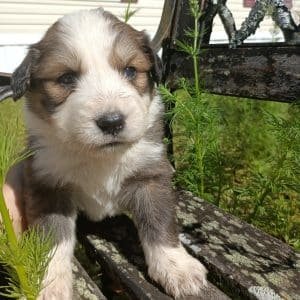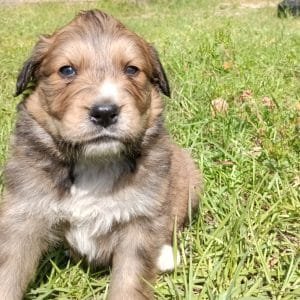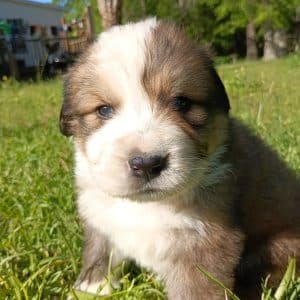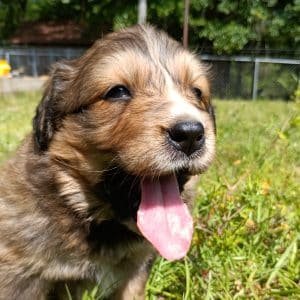Sorry, no puppies of this breed are currently available. Contact us to be notified when more are listed for adoption.
Have a question about our Great Pyrenees puppies?
"*" indicates required fields
overview of the Great Pyrenees Dog Breed
Are you looking for a larger dog breed that has a stunning white coat and brings a majestic, calm presence into your home?
If this describes what you want in your next dog, then take a look at our Great Pyrenees puppies for sale!
Bred to be a strong and watchful dog, Great Pyrenees are powerful dogs that are not afraid to work hard, keep a watchful eye for danger, and maintain a calm, consistent attitude. They are known to be a confident breed and show patience and gentleness towards family members, particularly children.
If you are looking for a calm protector for your family with a majestic coat and presence, then purchase your Great Pyrenees puppy today!
You can also browse our “all breeds” page for more puppy options.
Great Pyrenees temperament
Watchful: Great Pyrenees were bred to protect and watch flocks and cattle, and these traits continue with the breed today. They are not overly aggressive, especially if properly trained, but they will keep a watchful eye for their owners and family.
Responsible: These puppies often feel responsible for the safety of their family and territory. They may patrol their perimeter and check in on the people and animals they consider part of their “flock.”
Adaptable: While they have a history as mountain dogs, Great Pyrenees puppies can adapt well to various living situations, including suburban homes or rural areas. Adequate space and proper exercise are important, though.
Calm: While they can quickly spring into action if required, Great Pyrenees are known for having a natural zen-like attitude. They view their role as watching and protecting those around them and not always needing to be part of the action.
Patient: Great Pyrenees are known to be patient towards their family members, and particularly smaller children. They interact with children in a gentle and calm attitude.
Smart: Proper training is critical for Great Pyrenees, and they train well if it is done early and consistently. They are intelligent and independent, and if left to themselves, they can quickly follow their instincts.
Powerful: The breed is sturdy and powerful, and some Great Pyrenees are still used to pull carts. They were bred to defend against larger predators, and their bodies and attitudes are equipped for this role.
Remember that Great Pyrenees are a large and powerful breed, so early training, socialization, and positive reinforcement are essential for raising a well-behaved adult dog. They are loving companions and loyal protectors, making them wonderful additions to families willing to invest time and effort in their upbringing.
Great Pyrenees Breed history
Great Pyrenees were at one time the royal dog of France, and they have their origins in the Pyrenees Mountains in Southern France.
Descending from older dog breeds that were similar to various mastiffs, the Great Pyrenees was bred and trained to protect flocks and herds that would graze on the mountains and plains.
The dog was popular among shepherds and farmers because they were brave dogs that were not afraid to fight off attacking wolves, wild dogs, and other predators.
Their thick, white coats also allowed the breed to stay warm in the winter and blend in with the snow. This allowed the dogs to more easily sneak up and catch predators that were close to the flocks.
In the 1600s, the Great Pyrenees breed became the royal dog of France, and the breed began to be used to guard buildings and estates of the wealthy.
During the 1800s, the breed began to gain popularity outside of Europe and was brought to North America, Great Britain, and other cold regions.
In the United States, the Great Pyrenees breed was officially recognized by the American Kennel Club in 1933.
Breeds similar to the Great Pyrenees include Saint Bernards, Samoyeds, and Newfoundlands.
Great Pyrenees Average size
Great Pyrenees are a larger breed, and adult dogs range from 25-32 inches tall at the shoulder.
Females usually weigh 85 to 100 pounds, and males typically weigh from 100 to 120 pounds.
Average Great Pyrenees lifespan
Great Pyrenees typically live an average of 10-12 years.
Great Pyrenees body features
Great Pyrenees have one of the most stunning coats, especially for larger dog breeds. Their lush coat is usually all white, but some may have some off-color markings.
Their coat is a long, thick double coat. They also have plumed tails that sometimes curve into a natural shepherd?s crook.
Their broad chests, larger size, and beautiful coats make the Great Pyrenees a truly majestic breed.
grooming Your Great Pyrenees Puppy
Because they do have a thick double coat, it is important to be consistent with grooming and watch for tangles. The good news is the breed sheds less than expected, especially with its thick coat.
While their coat does naturally resist tangles and shed dirt, it still takes regular grooming from the owner to keep the coat clean and beautiful.
It is recommended that you give your Great Pyrenees a thorough grooming several times a week using a pin brush or slicker brush.
Keeping Your Great Pyrenees Puppy Healthy
The Great Pyrenees breed is overall healthy, but there are a few things that should be checked regularly.
Because of its long coat and hairy ears, it is essential to regularly check your dog for infections that can come when the hair does not dry correctly. This is most common in the ears and other places where moisture is not able to dry quickly.
Like all dog breeds, Great Pyrenees are susceptible to hip and elbow dysplasia, two of the most common health issues among dogs.
Hip and elbow dysplasia occurs when the leg or hip becomes weakened, and it can result in arthritis or potential lameness if not addressed.
One of the best ways to prevent this is by keeping your dog from too much running on hard surfaces, especially when they are puppies.
Typical Great Pyrenees Allergens
Allergens are caused by dander, which is dead skin cells. These skin cells are shed by any animal, including humans.
Even though they are not known as heavy shedders, it is important to note that the longer coat on the Great Pyrenees can cause allergen concerns. If you have someone in your home with animal allergy concerns, it is good to consult the family physician.
- 1. Are Great Pyrenees aggressive?Well-socialized and trained Great Pyrenees are not aggressive. However, this breed does have a protective nature and may bark or growl at things they perceive as threats. Because of their intimidating appearance, that may be enough for some people! It’s important to train and socialize your Great Pyrenees at a young age to prevent any unwanted aggression.
- 2. Are Great Pyrenees good with kids?With their calm, gentle natures, Great Pyrenees normally do well with children. They are patient, protective, and are sometimes even referred to as “nanny dogs” because of their tendency to take responsibility with kids. Of course, you should always supervise your children with your Great Pyrenees, simply because their large size can be intimidating and they may unintentionally knock small kids over.
- 3. Are Great Pyrenees playful?The Great Pyrenees is not an overly playful breed – don’t expect them to be the life of the party. They tend to take life seriously and stay on the sidelines, watching and protecting, instead of frolicking and carousing. However, that doesn’t mean they don’t have a fun side. They love to spend time with their masters, and enjoy activities like hikes or walks in the park.
- 4. Do Great Pyrenees show affection for their families?Great Pyrenees are intensely loyal and devoted to their masters, and can form strong bonds with the people they love and protect. In that sense, they show great affection for their families. However, they aren’t the most demonstrative about their affection. Don’t expect them to constantly seek attention or be big cuddlers. They tend to function more independently, although they do love their owners.
- 5. Is it difficult to train a Great Pyrenees?The Great Pyrenees is used to working independently and using his brain for himself. That is a good trait if you want a working dog to guard your sheep herd, but it can create some challenges with training. Great Pyrenees tend to have their own ideas about things and can be a little stubborn about them. They need a firm, consistent trainer to keep them in hand and prevent them from becoming uncontrollable, and aren’t a great choice for first-time dog owners.
- 6. Do Great Pyrenees bark?Yes – the Great Pyrenees thinks barking is her job. She’ll vocalize to warn you of anything she sees or to ward off intruders herself. You may need to address this if you don’t want your neighbors to get upset with the noise. We recommend that Great Pyrenees owners get a good set of earplugs.
- 7. What jobs do Great Pyrenees perform today?The Great Pyrenees is able to perform a variety of tasks today. They still guard livestock like they did years ago, but they also make great therapy dogs, search and rescue dogs, police dogs, and service dogs. And of course, they make wonderful family guardians and companions!
- 8. How much exercise do Great Pyrenees need?This breed does need exercise but not as much as you think. They are working dogs, but they have mellow personalities, so 20-30 minutes a day should be fine. They don’t mind a quieter lifestyle.
- 9. Do Great Pyrenees shed?Yes, be prepared for that gorgeous white coat to fall out everywhere. Great Pyrenees shed year-round, and more heavily at least once a year.
- 10. Are Great Pyrenees okay as apartment dogs?You could potentially keep a Great Pyrenees indoors because they are so mellow and calm. However, a large yard to run in would be ideal. If you keep a Great Pyrenees indoors, be prepared to find him squished onto any and every chair or bed you own, no matter whether he technically fits or not!












